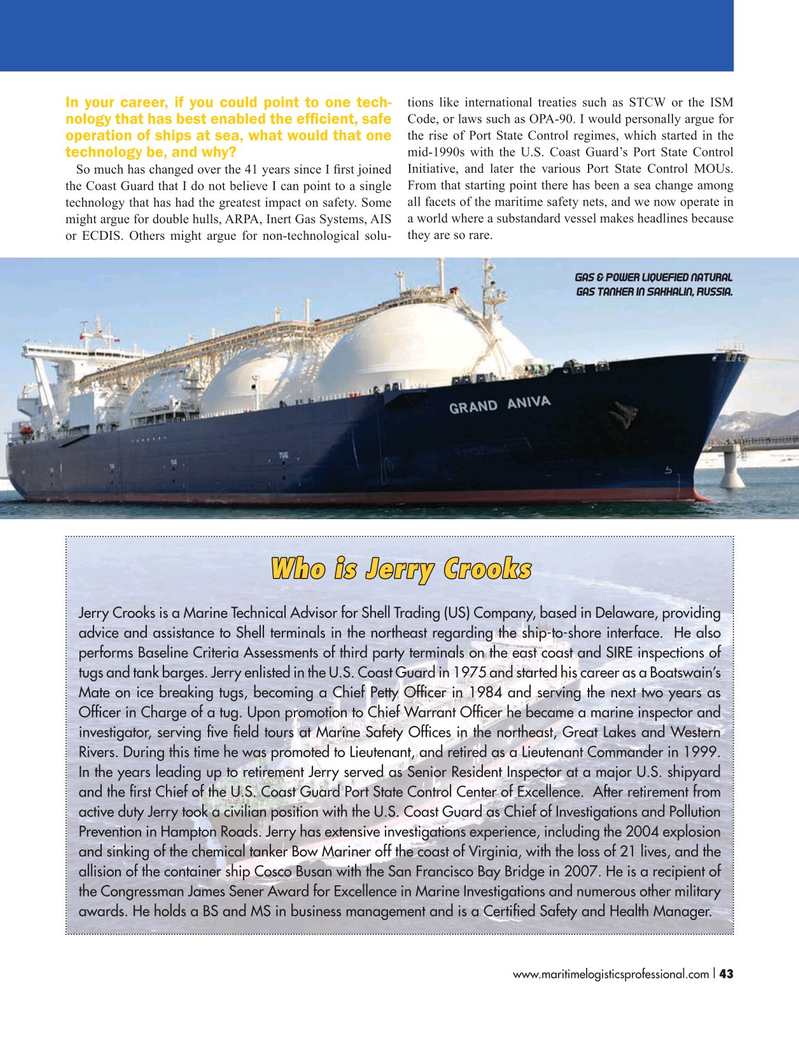
Page 43: of Maritime Logistics Professional Magazine (Q3 2016)
Shipbuilding, Repair & Maintenance
Read this page in Pdf, Flash or Html5 edition of Q3 2016 Maritime Logistics Professional Magazine
tions like international treaties such as STCW or the ISM
In your career, if you could point to one tech-
Code, or laws such as OPA-90. I would personally argue for nology that has best enabled the ef? cient, safe the rise of Port State Control regimes, which started in the operation of ships at sea, what would that one mid-1990s with the U.S. Coast Guard’s Port State Control technology be, and why?
So much has changed over the 41 years since I ? rst joined Initiative, and later the various Port State Control MOUs. the Coast Guard that I do not believe I can point to a single From that starting point there has been a sea change among technology that has had the greatest impact on safety. Some all facets of the maritime safety nets, and we now operate in might argue for double hulls, ARPA, Inert Gas Systems, AIS a world where a substandard vessel makes headlines because or ECDIS. Others might argue for non-technological solu- they are so rare.
Gas & Power liquefied natural gas tanker in Sakhalin, Russia.
Who is Jerry Crooks
Jerry Crooks is a Marine Technical Advisor for Shell Trading (US) Company, based in Delaware, providing advice and assistance to Shell terminals in the northeast regarding the ship-to-shore interface. He also performs Baseline Criteria Assessments of third party terminals on the east coast and SIRE inspections of tugs and tank barges. Jerry enlisted in the U.S. Coast Guard in 1975 and started his career as a Boatswain’s
Mate on ice breaking tugs, becoming a Chief Petty Of? cer in 1984 and serving the next two years as
Of? cer in Charge of a tug. Upon promotion to Chief Warrant Of? cer he became a marine inspector and investigator, serving ? ve ? eld tours at Marine Safety Of? ces in the northeast, Great Lakes and Western
Rivers. During this time he was promoted to Lieutenant, and retired as a Lieutenant Commander in 1999.
In the years leading up to retirement Jerry served as Senior Resident Inspector at a major U.S. shipyard and the ? rst Chief of the U.S. Coast Guard Port State Control Center of Excellence. After retirement from active duty Jerry took a civilian position with the U.S. Coast Guard as Chief of Investigations and Pollution
Prevention in Hampton Roads. Jerry has extensive investigations experience, including the 2004 explosion and sinking of the chemical tanker Bow Mariner off the coast of Virginia, with the loss of 21 lives, and the allision of the container ship Cosco Busan with the San Francisco Bay Bridge in 2007. He is a recipient of the Congressman James Sener Award for Excellence in Marine Investigations and numerous other military awards. He holds a BS and MS in business management and is a Certi? ed Safety and Health Manager.
www.maritimelogisticsprofessional.com 43I 34-49 Q3 MP2016.indd 43 8/17/2016 10:33:51 AM

 42
42

 44
44
